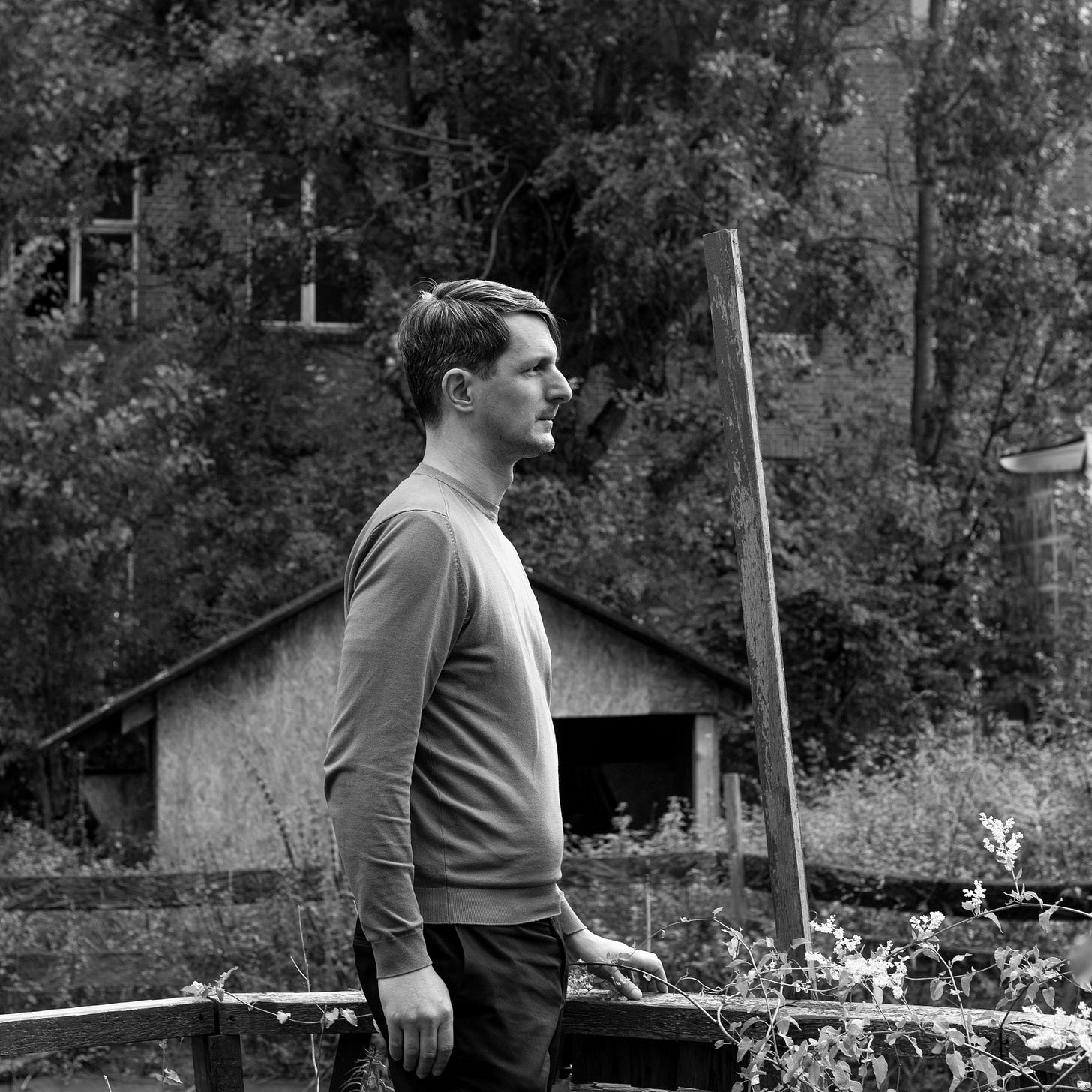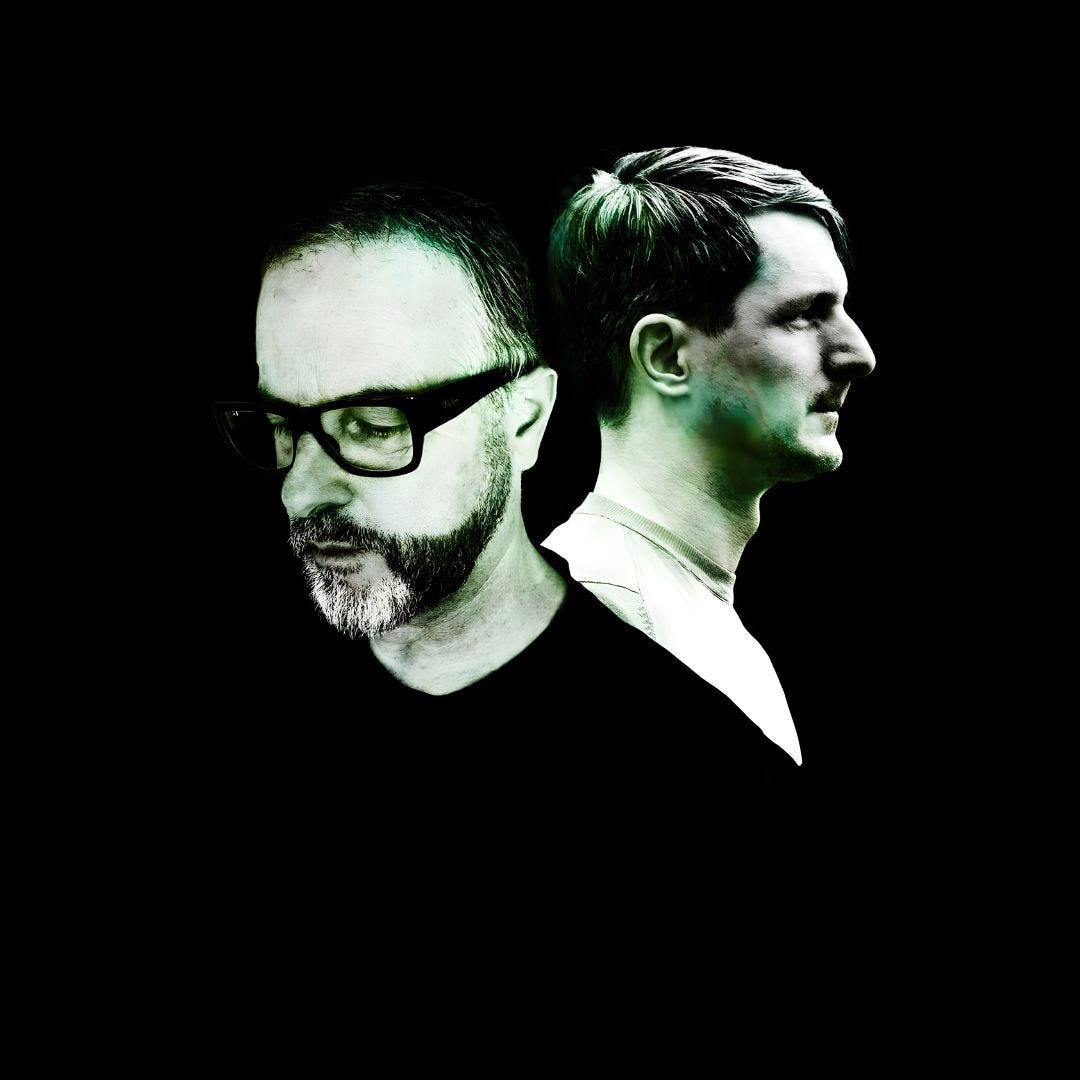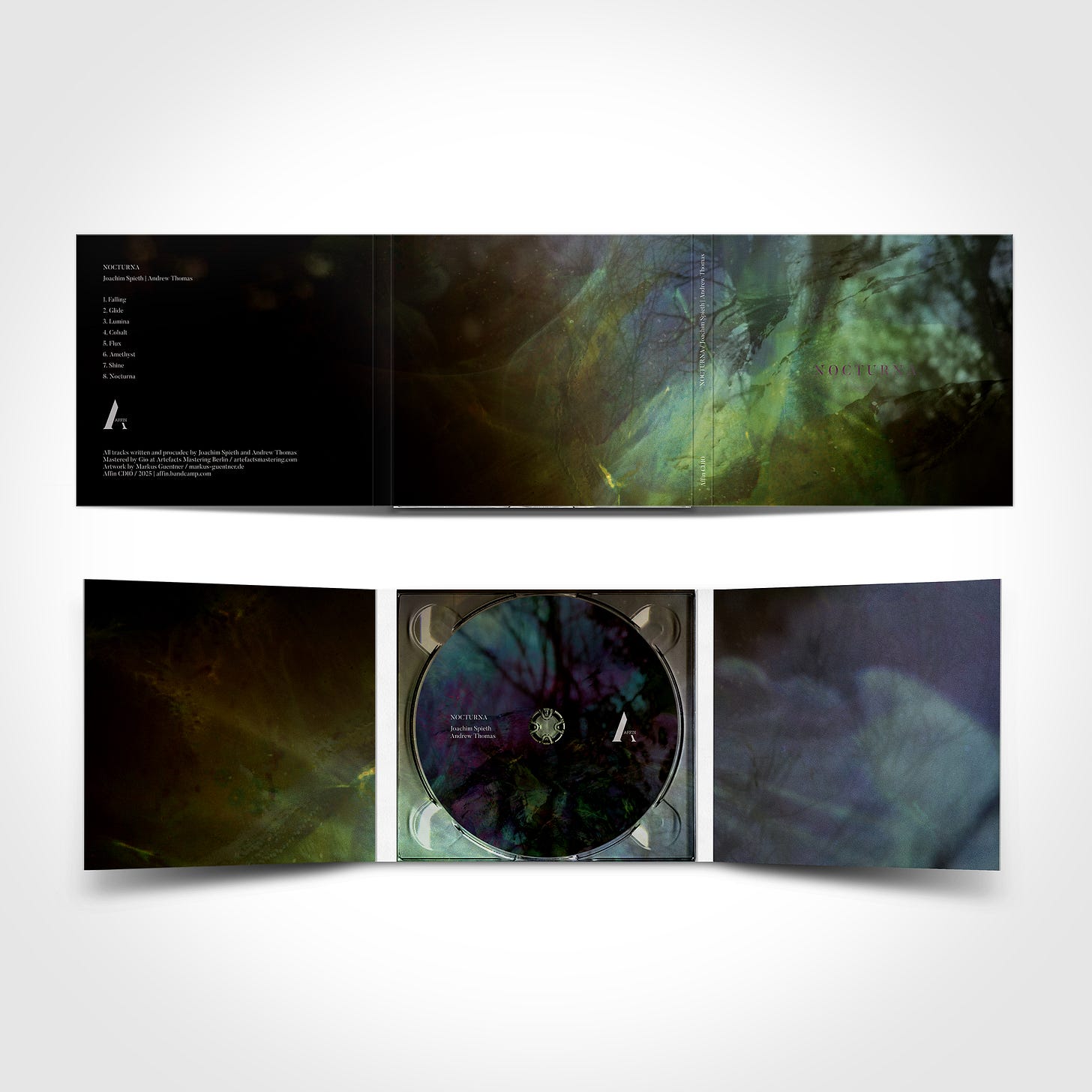Capturing Timelessness with Joachim Spieth & Andrew Thomas
In conversation with two first-time collaborators and long-time acquaintences about their new ambient record, Nocturna
Welcome to Instrumental Conversations, a new interview series with artists, label owners, and other creatives in the ambient and instrumental music space.
For this first edition, I spoke to Joachim Spieth and Andrew Thomas about their new record, Nocturna, out April 4 on AFFIN.
I'm fascinated by the certain sense of timelessness that comes across more evidently in ambient music than in any other genres I like or have produced. When I look through my record collection, I find that an above-average number of ambient records have this timeless quality. Perhaps, just simply because it's pure emotion that doesn't follow any other codes—maybe that makes it more independent of the temporal component… it’s this sense of timelessness that draws me in.
That was Joachim Spieth, ambient musician and head of independent music label
, writing to me about the primary reason he feels drawn to ambient music above all other genres. At his German-based label, Spieth has worked for nearly 20 years to create and promote independent electronic music, especially ambient and deep techno.Tomorrow (April 4), Spieth and his collaborator Andrew Thomas are releasing their first album together on AFFIN: Nocturna. The record is a fresh example of a timeless sound sought by so many ambient and instrumental artists. It is an encapsulation of several dualities: light and dark, night and day, north and south, time and space.
Nocturna fits seamlessly into AFFIN’s diverse array of releases—one common denominator among the catalogue is that every record sounds like it may stream from outside the conventional boundary of time. It isn’t hard to disconnect from that fourth dimension of time when listening to AFFIN’s curated works, whether it is Guentner’s latest experimental dark ambient endeavor Black Dahlia or the recent post-rock electronica effort Aegis of Silence from London-based label contributor Rhubiqs.
Simultaneously, each AFFIN piece is painted with a unique sonic pallete by artists like Thomas, who works halfway around the globe from Spieth in New Zealand, or AFFIN’s album-cover-artist-in-residence and frequent Spieth collaborator Markus Guentner, who dwells nearby in Germany.
While an element of timelessness feels essential in the work of Spieth and his collaborators, time certainly played a large role in the long dawning of Nocturna. Thomas recalled a time around 2 decades ago when both he and Spieth contributed tracks to Kompakt’s Pop Ambient compilations, a series that has run since 2001 and featured prominent artists in the ambient scene like GAS, The Orb, Tim Hecker, and many more.
Then in the summer of 2023, Thomas began to spend his days recording freeform, ambient piano improvisations. He got in touch with Spieth about collaborating on a project, but AFFIN’s release schedule was humming along and the pair decided to work together when the time was right.
That right time arrived in the springtime of 2024, when Thomas finally sent a collection of piano recordings to Spieth, who was ready to tinker, rearrange, and combine with his own textural layers. Spieth thought back and described the production process:
I took my time to slowly familiarize myself with the material and match my sample racks with Andrew's piano parts. Piece by piece, elements emerged that I would start to place and spread out around the piano. My idea was to give the piano the necessary space it required to be the leading instrument in some tracks and then to place more emphasis on the electronically generated soundscapes in others. After working with this approach for a while, an organic overall structure emerged. Although it didn't strictly follow these guidelines—it allowed the pieces to breathe and it painted a coherent picture as an album. Throughout this process, we exchanged parts so that we were always aware of what was going on musically.
Thomas concurred with Spieth on the “organic” nature of their work together, explaining how smooth the transfer of ideas became, and how they felt naturally in sync as artists and musicians. Above all, their willingness to allow each other to explore and experiment with each other’s work was the key. Thomas explains:
I wasn’t precious about any of it. I was more than happy for him to deconstruct and reconstruct passages of the piano… more than happy if he didn’t want to use any of it. I was really interested in allowing Joachim the freedom to do what naturally felt right for him as an artist—much like I had done when I had created the ambient piano improvisations.
While it took decades for Thomas and Spieth to finally collaborate, Thomas is deeply familiar with collaboration. Since working with Kompakt and The Orb in the early aughts, Thomas has made a career as a composer and production designer for film, theater, and exhibitions. The way he explained his work in film seems to reflect the open push and pull between artists that the duo described:
The music tends to always have an influence and outcome of design to picture. And more often than not, this leads to obvious musical solutions for the imagery, which can work well, but sometimes, artistically, is not that interesting. When I’m composing my own music, I enjoy the freedom of expression, an artistic, personal expression. It’s important to maintain that in the film work if you can.
Perhaps it isn’t suprising, then, that his ambient piano improvisations for Nocturna developed a subliminal theme of the interaction between light and sound. Spieth picked up on this idea quickly, too—another example of their synchronization. Thomas remembered:
We started to understand early in the process where we felt the voice of the album needed to hit artistically, aesthetically, and emotionally, which was very exciting for both of us.
Spieth echoed this, sharing his desire to do justice to both sides of the music—Thomas’ piano and his own electronics. This commitment helped shed an even stronger light on the emerging themes, he explained:
I was fascinated by the interplay between the two elements, and how one provides a condition for the other. In the end, a balance emerges between the two that can be felt as a duality of light and shadow in the music. In regards to time, it is a weathering, perhaps, of Andrew’s pieces as they passed through my hands and I spent that summer last year working with them intently.
It would be remiss of me not to mention the track titles that give some form to Nocturna’s cerebral themes. Glide. Lumina. Flux. Shine. Lightness and luminance are evident in these words. Counter them now with the other four track titles: Falling. Cobalt. Amethyst. Nocturna. It’s subjective, of course, but to me, these feel a bit darker, colder, heavier.
This is the innate beauty of Nocturna I keep returning to—the duality of life. When I asked Spieth and Thomas about the tracks that resonated most deeply with them, they each mentioned very personal memories associated with the songs.
Spieth highlighted Lumina, which was crafted during a time when a close friend of his was going through a crisis. He reflected:
Whenever I listen to Lumina now, I return to that time and the conversations and walks we took together. It's not necessarily my favorite piece, but it left a very personal impression on me.
Thomas latched on to Shine for a similar reason:
[Shine] was composed when my wife Margy was not well. This piece really helped me to relax and get through those worrying times. And will always remind me of our very special love for one another.
In a way, the influence that these moments in time had on the final tracks represents another duality: the beauty and hardship of life. When you love someone so deeply, their challenges affect you just as deeply. You worry and you fret endlessly on their behalf. Life may give you beautiful moments walking and chatting with someone close to you, but you may also feel the emotional weight of supporting that person through a difficult time.
For so many of us, music is an escape from the dualities we experience in life. It can be draining to constantly look for the good when you’re surrounded in darkness, or feel darkness when you’re surrounded by light. Escape is often that search for timelessness that Speith mentioned several times during our conversation—ambient music like Nocturna is special precisely because it can hold both light and dark in perfect balance, without saying anything but possessing the ability to make you feel anything and everything. Upon deep listening, one can hear, see, and feel both. Or, the light or the dark can take over, depending on your personal circumstances—your own place in time and space.
Or… you can listen to Nocturna and simply drift away, escaping everything. At least for a little while, or perhaps a long while. With records like Nocturna, it’s hard to tell just how long you’ve been listening, but it’s easy not to mind.
Nocturna is available for purchase now and will begin streaming on Bandcamp via AFFIN on April 4, 2025. You can buy it on digital or 6-panel CD, pictured below.
Thank you for reading, friend. Until next time.
Your friend,
Melted Form
Acknowledgements
Thank you to Joachim Spieth and Andrew Thomas for participating in this interview and sharing their thoughts and music with me. Another big thank you to Karen Vogt for facilitating this written interview and providing images and background information.
Correction: In the original version of this article, I mistakenly stated that Spieth and his label AFFIN were based in Berlin. They are based in Germany, but not specifically in Berlin.
Want more great ambient music? Subscribe!
Every Friday, I send out a newsletter with new music recommendations, including a handful of great new ambient records. I prioritize small label and indepedent artists, but I also share a list of major records I’ll be listening to from other genres like electronic, alternative, jazz, pop, and more.
Read my latest weekly post:









thanks for having us!